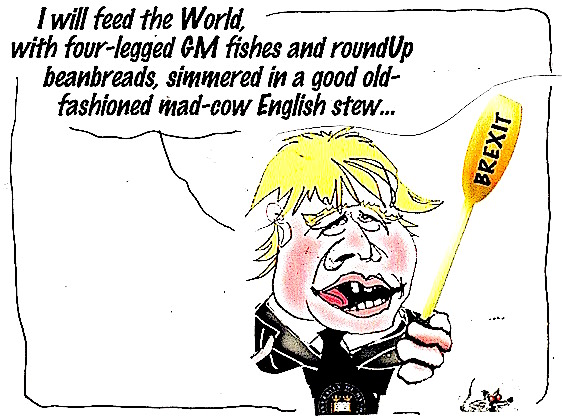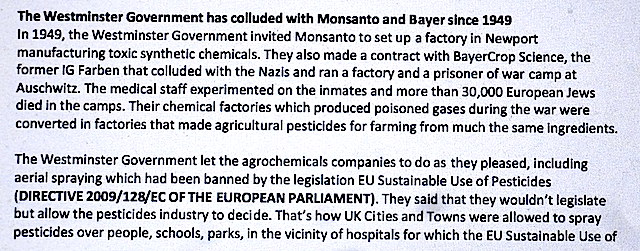Search
Recent comments
- crime against peace....
4 hours 36 min ago - why is Germany supporting the ukrainian nazis?....
5 hours 48 min ago - sanctioning....
8 hours 32 min ago - politico blues....
9 hours 12 min ago - gender muddles....
9 hours 32 min ago - war crimes and war crimes....
12 hours 21 min ago - new yourp....
13 hours 1 min ago - piracy not included....
13 hours 30 min ago - faceblock......
15 hours 27 min ago - 22-......
16 hours 33 min ago
Democracy Links
Member's Off-site Blogs
brexit royal roundup to crap crops, poison town waters and kill you early...

Environmentalist Dr Rosemary Mason has ... written an open letter addressed to three senior officials in Britain: John Gardiner, Under Secretary of State for the Department for Environment, Food and Rural Affairs in the British government; Chris Whitty, the Chief Medical Officer for England; and Chris Wormald, Permanent Secretary at the Department of Health and Social Security.
Her letter focuses on the issue of food and the herbicide glyphosate. But the issues she discusses should not be regarded as being specific to the situation in Britain: they apply equally to countries across the world which are facilitating the interests of global agrochemicals conglomerates.
....
Mason asks:
Monsanto, the British government and the UK and EU regulators say that glyphosate is safer than table salt. But would table salt kill all these insects that we recorded in our photo-journals or cause apocalyptic declines globally?”
She adds that the invertebrates in her nature reserve were poisoned. But that was only the half of it:
My neurologist concluded that I had developed a toxic neurodegenerative disorder secondary to long-term exposure to glyphosate-based herbicides.”
Mason proceeds to outline the cosy relationship between the agrochemicals sector, Cancer Research UK and the British government, the result of which is to promote a disease narrative that diverts attention from the effects of toxic agrochemicals and place the blame on individual lifestyle behaviour, choice of diet and alcohol consumption. She asks:
Where is the scientific evidence for this?”
Aside from the government’s collusion with pesticides manufacturers, Mason says the corporate media, most notably in Britain, are silent about pesticides that are poisoning the public:
They haven’t informed the British people about the trials involving Roundup in the US. Bayer estimates that there are currently more than 42,000 plaintiffs alleging that exposure to Monsanto’s Roundup and other glyphosate-based herbicides made by Monsanto caused them or their loved ones to develop non-Hodgkin lymphoma. In the UK, there were 13,605 new cases of Non-Hodgkin Lymphoma in 2015 (and 4,920 deaths in 2016).”
- By Gus Leonisky at 28 Dec 2019 - 7:46am
- Gus Leonisky's blog
- Login or register to post comments

from the anonymous royal roundup house letter writer...
From:
no-reply@defra.ecase.co.uk on behalf of Ministerial Contact Unit
<correspondence.section@defra.gov.uk>
To:
"rosemary.mason01@btinternet.com" <rosemary.mason01@btinternet.com>
Sent:
Tuesday, 5 November 2019, 11:23:05 GMT
Subject:
Glyphosate - Ref: TO2019/22109
Dear Dr Mason,
Thank you for your email of 20 October to Lord Gardiner, in which you provided a link to an article about herbicides, in particular glyphosate. I have been asked to reply.
The Government's first priority with regard to herbicides and other pesticides is to ensure that they will not harm people or pose unacceptable risks to the environment. To this end, we operate a strict system for regulating pesticides. Decisions on the use of pesticides are based on a careful scientific assessment of the risks, and a pesticide may only be placed on the market in the UK if the product has been authorised by our expert regulator, the Health and Safety Executive (HSE).
Following a thorough risk assessment, HSE imposes conditions on the way pesticides are used to ensure there is no harm to human health and no unacceptable effects on the environment. Pesticides that pose unacceptable risks are not authorised. Glyphosate is no exception to this and, as for all pesticides, is subject to restrictions to ensure that its use will not harm people or have unacceptable effects on the environment. UK experts participated in the European Food Safety Authority's assessment of glyphosate and support its conclusions that all the safety standards are met.
The Government therefore agrees with the EU decision to approve glyphosate for continuing use. We will continue to keep an active watch on the scientific evidence on glyphosate.
Yours sincerely,
Ministerial Contact Unit
----------------------
The scientific evidence on glyphosate is that it kills insects, including bees, and that there is a cosy relationship between the agrochemicals sector, Cancer Research UK and the British government, the result of which is to promote a disease narrative that diverts attention from the effects of toxic agrochemicals and place the blame on individual lifestyle behaviour, choice of diet and alcohol consumption.
Roundup is toxic to life — otherwise it would not be used... Think about it.
balancing risks of pesticides against benefits to society?...
The British government, regulators and global agrochemical corporations are colluding with each other and are thus engaging in criminal behaviour. That’s the message put forward in a new report written by environmentalist Dr Rosemary Mason and sent to the UK Environment Agency. It follows her January 2019 open letter to Werner Baumann, CEO of Bayer CropScience, where she made it clear to him that she considers Bayer CropScience and Monsanto criminal corporations.
Her letter to Baumann outlined a cocktail of corporate duplicity, cover-ups and criminality which the public and the environment are paying the price for, not least in terms of the effects of glyphosate. Later in 2019, Mason wrote to Bayer Crop Science shareholders, appealing to them to put human health and nature ahead of profit and to stop funding Bayer.
Mason outlined with supporting evidence how the gradual onset of the global extinction of many species is largely the result of chemical-intensive industrial agriculture. She argued that Monsanto’s (now Bayer) glyphosate-based Roundup herbicide and Bayer’s clothianidin are largely responsible for the destruction of the Great Barrier Reef and that the use of glyphosate and neonicotinoid insecticides are wiping out wildlife species across the globe.
In February 2020, Mason wrote the report ‘Bayer Crop Science rules Britain after Brexit – the public and the press are being poisoned by pesticides’. She noted that PM Boris Johnson plans to do a trade deal with the US that could see the gutting of food and environment standards. In a speech setting out his goals for trade after Brexit, Johnson talked up the prospect of an agreement with Washington and downplayed the need for one with Brussels – if the EU insists the UK must stick to its regulatory regime. In other words, he wants to ditch EU regulations.
Mason pondered just who could be pulling Johnson’s strings. A big clue came in February 2019 at a Brexit meeting on the UK chemicals sector where UK regulators and senior officials from government departments listened to the priorities of Bayer Crop Science. During the meeting (Westminster Energy, Environment & Transport Forum Keynote Seminar: Priorities for UK chemicals sector – challenges, opportunities and the future for regulation post-Brexit), Janet Williams, head of regulatory science at Bayer Crop Science Division, made the priorities for agricultural chemical manufacturers known.
Dave Bench was also a speaker. Bench is a senior scientist at the UK Chemicals, Health and Safety Executive and director of the agency’s EU exit plan and has previously stated that the regulatory system for pesticides is robust and balances the risks of pesticides against the benefits to society.
In an open letter to Bench, Mason responded:
That statement is rubbish. It is for the benefit of the agrochemical industry. The industry (for it is the industry that does the testing, on behalf of regulators) only tests one pesticide at a time, whereas farmers spray a cocktail of pesticides, including over children and babies, without warning.”
It seems that post-Brexit the UK could authorise the continued use of glyphosate. Of course, with a US trade deal in the pipeline, there are major concerns about glyphosate-resistant GMOs and the lowering of food standards across the board.
Read more:
https://off-guardian.org/2020/07/28/post-brexit-agrochemical-apocalypse-for-the-uk/
Read from top.